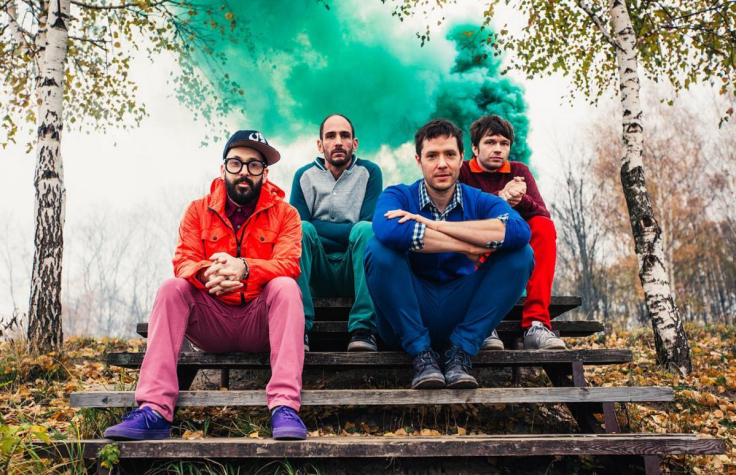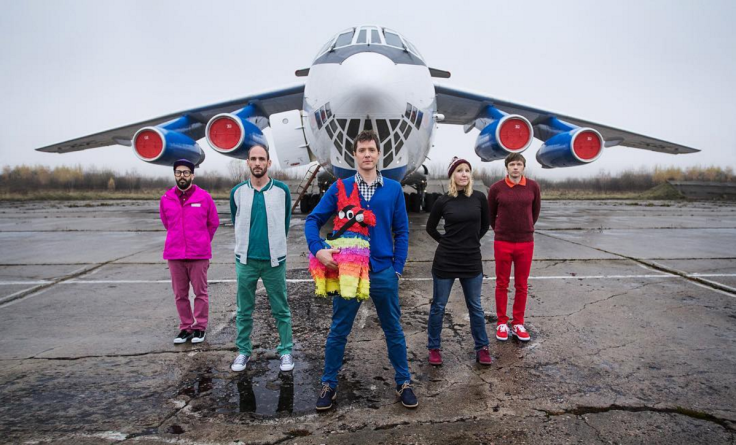Why OK Go’s Damian Kulash No Longer Trusts YouTube View Counts

There is no OK Go without YouTube. The D.C. rock quartet is arguably the first band to build most of its brand on the streaming video hub, and over the past decade, it has helped to redefine what internet success looks like.
Since their 2005 treadmill-powered video for "Here It Goes Again" became one of the first famous viral videos, OK Go has collected more than a quarter-billion video views on YouTube, won a Cannes Lion (the advertising equivalent of an Oscar) for its work with Honda, and gathered a loyal following that's allowed the band to stay independent.
For a while, it seemed like OK Go's relationship with YouTube was symbiotic. But last week, signs surfaced that something has changed. A new OK Go video arrived, after many months of promises and teasers from the band, but it appeared on Facebook, the social network that's quickly becoming a video hub in its own right. That was no accident. After more than 10 years of building their brand on YouTube, the band decided it was time to start looking for an alternative.
International Business Times spoke with the band's lead singer, Damian Kulash, about YouTube, music in marketing, and where the band expects it will go next. The conversation has been lightly edited for brevity and clarity.
International Business Times: You must be very pleased with the response to the video so far.
Damian Kulash: I could not be more pleased. It's really been spectacular. You know, the internet changes so fast, and so it's really hard to do an apples-to-apples comparison to any video we've done before. But it does feel like the world is really noticing, and that feels great.
IBT: It feels like your band has watched the Internet change from a front-row seat. You’ve been doing this for more than 10 years.
Kulash: This whole weird avenue of creativity opened for us in part because we were willing to try some other way. The way the music industry worked in 2005, 2006, anything you did online was some kind of test. Stumbling across not only a way to connect to fans, but also a whole new creative canvas has been so gratifying. Whenever we roll out a new video, we try to see a new way to do that.
IBT: Putting this video on Facebook gives you a good opportunity to keep all the views and comments and data about your video to yourself, too. Debuting it on YouTube leaves you vulnerable to someone ripping the video off there and posting it on their own elsewhere. Is that right?
Kulash: I wouldn't describe it quite the same way, but you're not wrong. What feels a little different about Facebook is it's more geared toward sharing directly. 10 years ago, something on YouTube mostly got shared as links. And now people are sharing things in a different way.
This is just something we'd never done. It was a space we'd never tried using. It's in a space where we have a lot of communication with our fans, but we just thought we'd try to put the art there.
IBT: But the key here is that it's going to live on Facebook for a while. This isn't some short window experiment that's only going to last a week, is it?
Kulash: Eventually I'm sure we'll put it on a streaming service so it's much more able to be found on search engines and places like that.
I will say one of the things that we considered here was that the aggregate view numbers were a really big metric for success a few years ago, and that started to become something that made us suspicious, and here's why:
First of all, metrics for success are scary for creative people. The music industry is filled with them: "How are you doing on radio? How are your record sales? Where are you on this chart?" That information has so much bearing on which creative avenues are open and closed to you, and they form these rigid rules by which you have to live. Part of how we wound up making these videos in the first place is that they were a way we were able to make stuff we knew people loved and were having fun with, and getting outside that system of very rigid metrics.
When views became a way to look at how successful something is, with a heavy weight of anxiety on it, that was, creatively, not that fun.
On top of that, there's so many Madison Avenue firms that know how to optimize those types of numbers now that I don't really believe them the same way that I used to. When the treadmill video did over 100 million views, that was mammoth for us. There's plenty of things that get 100 million views these days that no one seems to know very much about, and I don't know where those views are coming from. It means that metric has stopped meaning very much.
So around the beginning of this project, we were kind of like, “Let's worry less about the metric, and let's think about how we can get this in front of as many eyeballs as possible.”
And loving eyeballs. I don't want robotic eyeballs. I want people who actually see this thing and have a reaction.

IBT: Also being able to see the ways in which your video moves around on a platform like Facebook must be very gratifying.
Kulash: One thing that's been really different on Facebook is the commenters haven't been anonymous, so you get a much more earnest type of discussion. Which has made us really happy. Instead of it being people just flaming each other, there seems to be more discussion of the actual work, which is great for us.
IBT: It felt almost inevitable that you would wind up doing something in zero gravity someday, but my understanding is that this whole project came about because you ran into S7 Airlines' marketing people in Cannes. Is that right?
Kulash: That is half right. Their agency had actually reached out to us before I was at Cannes, but the opportunity to meet with the people themselves was invaluable. There are projects we'd done before that have won a lot of Cannes Lions in the past, and I've met a lot of creative people and potential business partners there.
It's a really weird thing for a band to fall into this position. The music industry used to be this monolithic thing, and our managers would basically spend their days on the phone yelling at the record labels trying to wrest free some financial support. The way something would be successful in the music industry was a record label would pay to make it successful. So a manager's job was to scream at the label until the label relented and maybe spent a little money on promotion. With the sort of dissolution of that model, there's so many ways for people to fund their art and distribute their art, and we just tapped into this.
When we find brands that are willing to genuinely hand over what they make and let us play with it and collaborate with it, we almost invariably wind up with something we love to make.
When I met with the people with S7, all we really had to discuss was, "We want to make art with airplanes. You guys have airplanes. Do you think that would be cool?"
As long as they can fully understand that, that this isn't some Macchiavellian marketing campaign but rather they have to make a brave leap of faith, they get a great result.
That's not normally how marketers think, but when they do, they get amazing results.
IBT: Speaking of Cannes, this is the first year there will be an entire category devoted to the use of music in marketing. As someone who's done a lot to show how well bands and brands can work together, are you heartened that this exists now?
Kulash: I guess so. I am cautiously optimistic that more great stuff is going to come from artists and brands working together. It really depends. From the highest possible altitude, funding art is a difficult question. There's all this money in marketing, and when it can be used to make great art, that is wonderful. But almost every question that follows when you go down that line, you have to give a really qualified answer to.
Just pouring marketing money into artistic endeavors doesn't necessarily mean more or better artistic endeavors. It often means they are furthering agendas that are really gross. What's key for us in deciding what to do with these projects is finding partners and situations where we have a mutual understanding that your brand and our brand are going to be part of the story, but first and foremost we are making something that is going to make people's days better and that they will feel happy about. But that very quickly gets lost in a lot of brand partnership discussions.
So when you say that Cannes Lions has a whole new category for partnerships, hopefully that will make more great stuff rise to the top. But it could also lead to more brands calling up bands to write songs with their products in it. Nobody wants their art to come with more weird corporate agendas written into it. This all works to one's benefits when people are taking the right path and not the wrong ones.
IBT: In the olden days, a music video was a marketing asset used to promote a current or newly released album. But you guys seem to have dispensed with that a long time ago. What are you going to do next?
Kulash: We'll see. We're making music now, our guitarist is about to have a baby, so I don't know how much touring we'll be doing. I like the looseness of this new world. People don't quite know what to do with themselves, but the schedule of albums and the rigidity of the plans that bands have to follow, I'm not sorry that that's fallen apart.
Beyond that, we'll chase the next creative idea and see where it takes us.
© Copyright IBTimes 2024. All rights reserved.





















